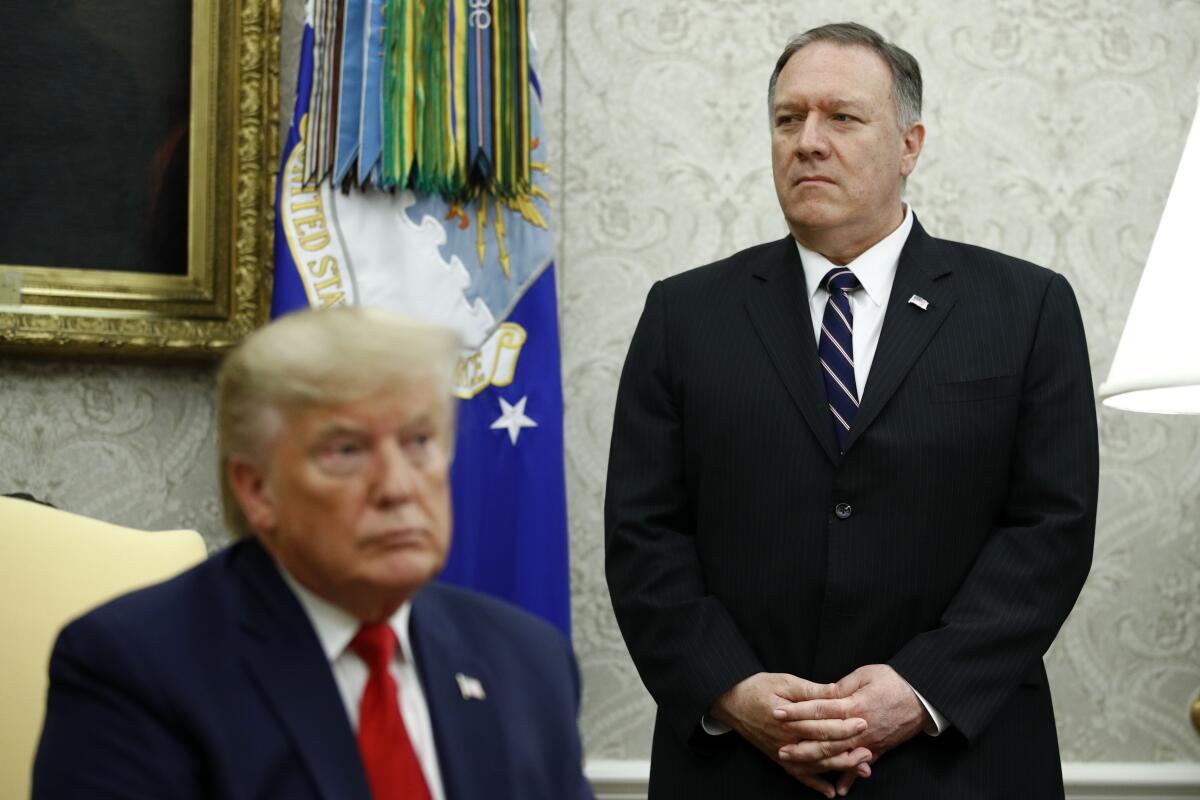Trump changes decades-old U.S. position on illegality of Israeli settlements

- Share via
WASHINGTON — Reversing decades of carefully worded U.S. policy, the Trump administration on Monday said that, in its view, Israeli settlements in the occupied West Bank do not violate international law.
The move could clear the way for Israel’s annexation of settlements on the disputed land and runs counter to most of the international community, which has declared that under the Geneva Convention, Jewish settlements built on land seized by Israel during the 1967 Middle East War are illegal. The convention bars an occupying power from transferring parts of its own civilian population to occupied territory.
President Trump’s new position also further undermined Palestinians’ bid for statehood and greatly reduced chances of renewing peace talks, Mideast experts said.
For many years U.S. policy has been intentionally vague on the sensitive issue of settlements’ legal status. The clearest statement came under President Carter in a 1978 State Department legal opinion, which found settlements to be “inconsistent with international law.”
President Reagan said in an interview that he disagreed with that view, but his administration held to a policy in favor of freezing settlements.
Since then, presidents and administrations from both political parties have largely avoided any formal legal opinions about the settlements, instead calling them “unhelpful,” “provocative” or a hindrance to peace. Additionally, Trump’s predecessors had pressed Israel to varying degrees to stop building settlements on land that Palestinians hope to one day make part of their state.
Secretary of State Michael R. Pompeo said Monday that the Trump administration disagreed with the 1978 State Department legal opinion.
“The establishment of Israeli civilian settlements in the West Bank is not, per se, inconsistent with international law,” Pompeo said.
It was unclear exactly what actions the administration was taking and whether it was formally rescinding the 1978 opinion. Pompeo said the new U.S. position was intended to jump-start peace talks.
“Calling the establishment of civilian settlements inconsistent with international law hasn’t worked. It hasn’t advanced the cause of peace,” Pompeo told reporters in a hurriedly called news conference.
The announcement drew immediate criticism from Palestinians and Israeli organizations that advocate for a peaceful, two-state solution to the Israeli-Palestinian conflict — a Palestinian state alongside Israel.
“This is not at all constructive for a legitimate peaceful solution,” said David Halperin, executive director of the Israel Policy Forum, a pro-Israel U.S. organization that advocates for a two-state solution.
“It will continue to breathe life into the Israeli right” and give a green light to eventual annexation of the West Bank, depriving the Palestinians of an independent homeland once and for all, he said in a telephone interview.
Israel’s settlement construction has skyrocketed over the last few decades, and the settlements now house more than 400,000 Israelis. Palestinians say the scattered Jewish communities already make it difficult to create a single, contiguous Palestinian state. In past peace talks, Palestinians have demanded that Israeli settlement construction be halted and existing settlements be removed.
“Israeli settlements steal Palestinian land, seize and exploit Palestinian natural resources, and divide, displace and restrict the movement of the people of Palestine,” said Saeb Erekat, a veteran Palestinian official. “In sum, Israel’s colonial-settlement enterprise perpetuates the negation of the Palestinian right to self-determination.”
Israeli Prime Minister Benjamin Netanyahu welcomed the U.S. announcement. He is in a fight for his political life, having failed to win enough support in two national elections this year to form a government and facing possible indictment on corruption and bribery charges. During the final campaign days of the last election, Netanyahu vowed to formally annex some parts of the West Bank.
“This policy reflects an historical truth — that the Jewish people are not foreign colonialists in Judea and Samaria,” he said, using a Jewish phrase for the West Bank. “In fact, we are called Jews because we are the people of Judea.”
Trump’s action could throw a lifeline to Netanyahu. His chief rival, Benny Gantz, has until Wednesday to form a new centrist government. If he fails, Israel might face its third election this year, giving Netanyahu another chance to keep his post.
The announcement Monday is the latest step in which the Trump administration has sided with Israel against Palestinian and Arab claims. Trump also moved the U.S. Embassy from Tel Aviv to Jerusalem and recognized Israeli sovereignty over the Golan Heights, captured from Syria in 1967.
Such moves proved popular with Trump’s base, particularly evangelical Christians. But because he did not negotiate any concessions from Israel in return, critics say the U.S. has squandered much of the leverage it had to advocate for a peace deal. Palestinians have refused to participate in peace talks under Trump, viewing his administration as one-sided.
Trump and his son-in-law, Jared Kushner, whom the president appointed to lead Israeli-Palestinian negotiations, have long promised to unveil a new U.S.-crafted peace plan, but to date the proposal has not materialized.
The Trump administration said it believes legal questions about settlements should be addressed by Israeli courts, but Palestinians say it is unrealistic to expect Israeli courts to fairly decide such an issue.
Pompeo said the administration’s review was prompted in part by President Obama’s decision at the end of his term to refrain from vetoing a United Nations Security Council Resolution that labeled Israel’s settlement activity a “flagrant violation” of international law that has “no legal validity.” The U.S., under Obama, abstained from the vote on that resolution.
Special correspondent Noga Tarnopolsky in Jerusalem contributed to this report.
More to Read
Sign up for Essential California
The most important California stories and recommendations in your inbox every morning.
You may occasionally receive promotional content from the Los Angeles Times.











